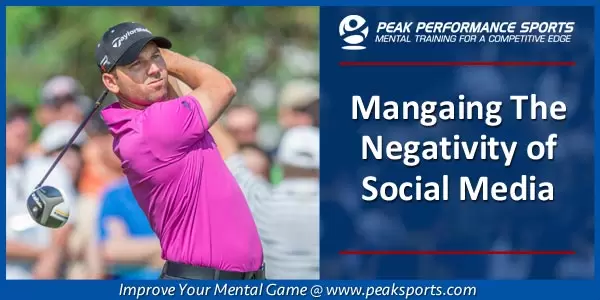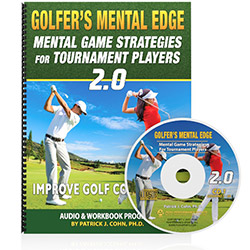
Social Media Effects In Sports
How much time do you spend poring over Twitter, Facebook and news sites reading comments about your golf potential or your level of play in tournaments?
Social media can be a confidence-crusher for some golfers.
The same media that builds up some golfers will often tear them down.
Then there are all those other people who view social media as an invitation to post their negative views about other golfers and their performance.
While social media can be useful for communicating to a greater number of people, it can detract for a golfer’s performance in two ways:
- Social media can place unrealistic expectations upon you for future play
- Social media can adversely affect your confidence
With smartphones, other people’s opinions are at your fingertips. If you subscribe to the opinions of others, your confidence and level of play will surely suffer.
Jordan Spieth, No. 1 in the Official World Golf Ranking, has been the subject of attention since he won Rookie of the Year in 2013.
Spieth has been compared to Tiger Woods and been called a golfing protégé. The media has set the bar high for Spieth but the media has also taken shots at Spieth suggesting he choked at the 2015 British Open.
After winning the 2016 Hyundai Tournament of Champions in commanding fashion, Spieth spoke of the dangers of paying too much attention on the expectations of the media, the negative commentary on social media outlets and how he is coping with it all.
SPIETH: “Just accepting that everything’s in the spotlight, everything’s going to be judged. Some people aren’t going to like your swing, the way you grip the club, it’s just everything’s under a microscope to, at least in the golf world, and now extending outwards. I guess accepting that and realizing accepting that everyone has their own opinions and, warranted or not. I struggle a bit with social media. Trying to quiet the noise there, just people that just want to make comments that — so I’ve just gone away from looking at any comments on Instagram, Twitter. People just want to say stuff just to say stuff. You guys see it everywhere. That’s the hardest part for us now is actually social media.”
It may be difficult to ignore the expectations and comments of others but it is critical for you to not allow the opinions of others to affect your confidence, performance and enjoyment of your sport.
Tips for Managing the Negativity of Social Media:
It may not be easy for you to totally avoid social media but you must arm yourself against the negative social commentary.
First, don’t visit the sites that are known to spew out negativity.
Second, remind yourself of the following:
- Everyone has an opinion
- Opinions aren’t facts
- Opinions can’t hurt your performance unless you buy into them
- The only opinion that matters is yours
Golfer’s Mental Edge

What’s the big sign that your mental game is the weak link in your golf game? When you can’t play consistently as well as when you play a practice or casual round–or your range game is way better than your game on the course. If you suffer from lack of focus, low self-confidence, poor composure or other mental game obstacles on the course, you can’t reach your true potential in golf.
The Golfer’s Mental Edge 2.0 Audio and Workbook program is ideal for any amateur, collegiate, junior, and tour professional golfer.
Golf coaches and instructors would also be wise to teach “The Golfer’s Mental Edge 2.0” principles to their players. This program is perfect for any golfer who wants to improve performance and consistency by managing their mind better on the course.
